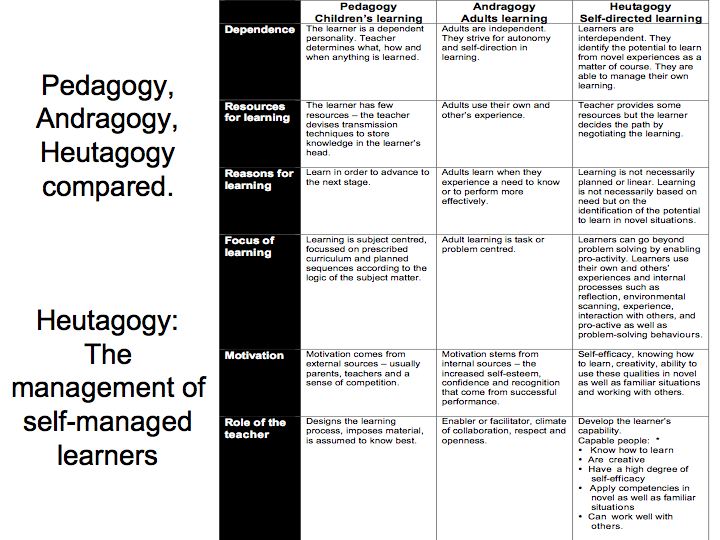And Then, There Is Heutagogy
You have heard of pedagogy. You may have heard of andragogy.
Pedagogy is the art or science of teaching and really has always focused on children. Andragogy is the theory and practice of teaching adults, and it comes directly out of pedagogy that did not address the specific needs in the education of adults.
Pedagogy is very old but andragogy only appeared as a field in the mid-1800s and in a more recent approach in the 1960s with the work of Malcolm Knowles.
Some of the basic principles of andragogy are that, compared to children: Adults will learn only what they feel they need to learn. They are practical in their approach to learning. They will more easily accept learning a theory before that theory is applied to a situation than a child. They bring more experience to learning and that will both aid their learning and bring biases that hinder new learning. Even more than children, they learn by doing. Adult learning focuses on problems and the problems must be realistic. They do not need as much sequential learning or formal curriculum.
With children and adult learning covered, what is heutagogy?
Heutagogy is not age-based. It is the study of self-determined learning. It challenges some of the ideas about teaching and learning that are rooted in the teacher-centered learning that most of us experienced.
There has been some natural movement from andragogy to heutagogy that has been generated by technology (media, Internet, online learning, MOOC) and by changes to formal education. This is especially evident in higher education where discussions of alternative degrees and ways of measuring mastery of learning and the patch to a degree are being discussed seriously.
Hase and Kenyon (2000) coined the term heutagogy as self-determined learning which essentially means that a learner (rather than a teacher or institution) should be at the center of the learning. This learner-centric approach is very much a 21st century approach and is particularly popular in e-learning environments.

Trackbacks
Trackback specific URI for this entryThe author does not allow comments to this entry
Comments
No comments